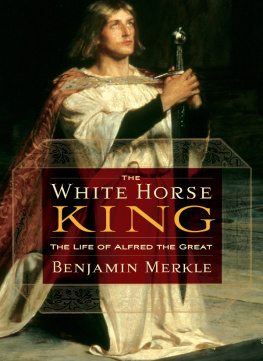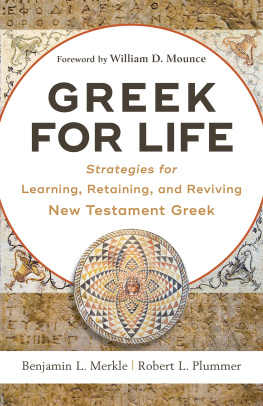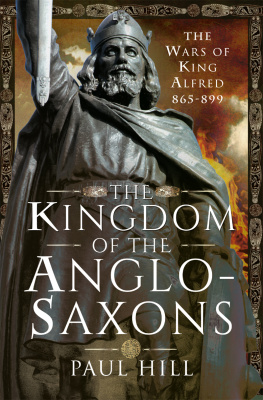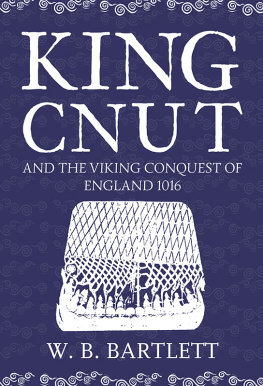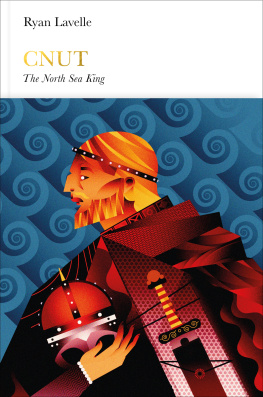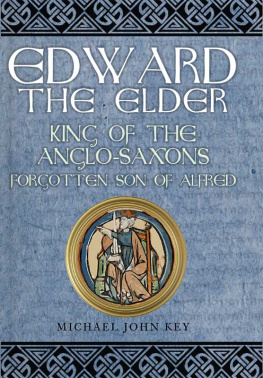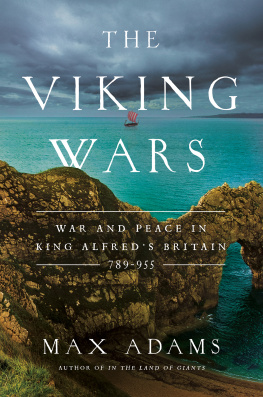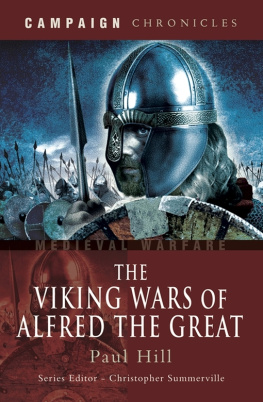2009 by Ben Merkle
All rights reserved. No portion of this book may be reproduced, stored in a retrieval system, or transmitted in any form or by any meanselectronic, mechanical, photocopy, recording, scanning, or otherexcept for brief quotations in critical reviews or articles, without the prior written permission of the publisher.
Published in Nashville, Tennessee, by Thomas Nelson. Thomas Nelson is a registered trademark of Thomas Nelson, Inc.
Thomas Nelson, Inc. titles may be purchased in bulk for educational, business, fund-raising, or sales promotional use. For information, please e-mail SpecialMarkets@ThomasNelson.com.
Maps on are inspired by maps in Richard Abels Alfred the Great.
Map on is inspired by a map in Ryan Lavelles Fortifications in Wessex c. 8001066.
Map on is inspired by a map in Alfred P. Smyths King Alfred the Great.
Library of Congress Control Number: 2009935985
ISBN: 978-1-5955-5252-5
ISBN: 978-1-4185-8103-9 (eBook)
09 10 11 12 RRD 6 5 4 3 2 1
FOR BEKAH
Hwa eos, e gesih swa swa se morgen
Fger swa se mona
Beorht swa se sunne
Torhtmod swa se scildweall.
Contents
Before the gods that made the gods
Had seen their sunrise pass,
The White Horse of the White Horse Vale
Was cut out of the grass.
Before the gods that made the gods
Had drunk at dawn their fill,
The White Horse of the White Horse Vale
Was hoary on the hill.
Age beyond age on British land,
ons on ons gone,
Was peace and war in western hills,
And the White Horse looked on.
For the White Horse knew England
When there was none to know;
He saw the first oar break or bend,
He saw heaven fall and the world end,
O God, how long ago.
FROM G. K. CHESTERTONS The Ballad of the White Horse
thelwulf (king of Wessex AD 839858)
married first to Osburh and then to Judith
CHILDREN OF THELWULF AND OSBURH:
thelstan
thelbald (king of Wessex AD 858860)
thelswith (married to Burgred, king of Mercia)
thelberht (king of Wessex AD 860865)
thelred (king of Wessex AD 865871)
Alfred (king of the Anglo-Saxons AD 871899), married to Ealswith (died AD 902)
ALFREDS CHILDREN:
thelfld (queen of Mercia, died AD 918) married to thelred (ealdorman of Mercia AD 880911)
Edward the Elder (king of the Anglo-Saxons AD 899924)
thelgifu (abbess of Shaftesbury)
lfthryth married to Baldwin (count of Flanders)
thelweard
Edwards son was thelstan (king of the Anglo-Saxons AD 924939)
| AD 410: | Visigoths attack Rome, causing Emperor Honorius to abandon Roman Britain. |
| AD 410600: | Migration of the Angles, Saxons, and Jutes from the continent to the island of Britain. |
| AD 597: | Augustine of Canterbury takes office and begins the Christianization of the Anglo-Saxons. |
| AD 635: | Aidan founds a monastery on Lindisfarne. |
| AD 684: | Cuthbert becomes bishop of Lindisfarne. |
| AD 793: | Vikings raid Lindisfarne. |
| AD 839: | thelwulf becomes king of Wessex. |
| AD 849: | Alfred is born in Wantage. |
| AD 853: | Alfred is sent to Rome, and his mother, Osburh, dies. |
| AD 855: | Alfred travels to Rome once more with his father. |
| AD 858: | thelwulf dies, and the crown passes to thelbald. |
| AD 860: | thelbald dies, and the crown passes to thelberht. |
| AD 865: | thelberht dies, and the crown passes to thelred; the great heathen raiding army lands in Kent. |
| AD 866: | York and the kingdom of Northumbria fall to the Vikings. |
| AD 868: | thelred and Alfred march to besieged Nottingham; Alfred marries Ealswith. |
| AD 869: | East Anglia falls to the Vikings; Edmund is martyred. |
| AD 871: | thelred and Alfred fight the battle of Ashdown; thelred later dies, and the crown passes to Alfred. |
| AD 878: | Guthrum invades Wessex; Alfred is driven into hiding in Athelney; Alfred fights the battle of Edington; Guthrum is baptized. |
| AD 885: | Alfred drives the Vikings from the gates of Rochester. |
| AD 887: | Alfred begins to read Latin. |
| AD 890: | Guthrum, now thelstan, dies. |
| AD 892: | Raiding army returns from the continent. |
| AD 896: | Alfreds new longboats fight a sea-battle. |
| AD 899: | Alfred dies, and the crown passes to Edward. |
| AD 924: | Edward dies, and the crown passes to thelstan. |
| AD 937: | thelstan is victorious at the battle of Brunanburh. |
T his past year, while taking a moment between classes to relax in an Oxford common room, I began a conversation with an older English gentleman over a cup of tea. Noticing my American accent, he asked how I was getting on in England and if I had seen much of the beautiful countryside yet. I mentioned that I had hoped to take my family to Wantage that weekend because it had been the birthplace of Alfred the Great. He sipped his tea silently for a moment and then looked off into the distance with a skeptical eye and said, Alfred, hmmm. Its all very shrouded in myth, you know. Im not sure if there actually was an Alfred.
You could tell that he was grappling with two problems. The first, Im fairly certain, was a confusion between King Alfred and King Arthur. The second was a deep, deep need to express a scholarly dubiousness. This is the burden of the scholar, the need to scratch through the gilding that obscures the stories of historys heroes, to lay open the ugly truth of ulterior motives, vainglorious pride, and bad breath. But sometimes the heroes of history are truly worthy of the golden reputations they carry. Sometimes the truest retelling of the story is permeated with hero worship.
In the early, frigid months of AD 878, the whole of Britain had fallen to the savage dominion of the Viking invaders. The Saxon kings who had fought against the Danes had been either cut down in bloody combat or captured and executed in a gory sacrifice. A few lucky ones escaped the clutches of the Vikings and fled the island in humiliating defeat. Only one Anglo-Saxon king remained to hold off the Viking assaultKing Alfred, the young king of Wessex. This is the story of the Anglo-Saxons greatest king, the young man who, though driven from his throne and hunted everywhere by his savage enemies, refused to give up his fight for his nation.
This is the king who took a war-weary band of Anglo-Saxon men, hidden on the small swampy island of Athelney, and led them from where they teetered on the edge of extinction back to face their enemies once more on the battlefield. This is the man who later kindled such a flame for Christian learning in the hearts of his people that he launched the greatest literary renaissance that Anglo-Saxon England ever knew. This is the story of the only English king to be known as the Great. He was a seasoned warrior, a scholar, a poet, a law-giver, an architect of towns and ships, and a zealous Christian.
Alfred was great because Alfred was a great king.
Behold the church of saint Cuthbert, splattered with the blood of the priests of God, plundered of all its treasures, a place more venerable than anywhere in Britain is given over to pagan nations for pillaging...
ALCUIN TO ETHELRED, KING OF NORTHUMBRIA
I n the year anno Domini 937, thelstan, king of the English people, stepped resolutely onto the battlefield of Brunanburh, leading the might of the Anglo-Saxon nation out to face the combined forces of Vikings and Picts in what would be referred to by successive generations as the great battle.1 King thelstan, grandson of Alfred the Great, stood at the head of the Saxon forces as they heedlessly hurled themselves at the spear-ready line of the awaiting Danes and Picts. A thundering tumult the Saxons came, a reckless battering ram of mortal flesh, propelled by the passion and zeal of the king, whose fierce commands mounted up above the din and clamour of the chaotic charge. The linden shields of the Viking marauders split and shattered under the raging crush of the Saxon force. The Northmen faltered and staggered backward, yielding ground and, more importantly, leaving a number of gaps ripped through the center of their defensive wall.
Next page
